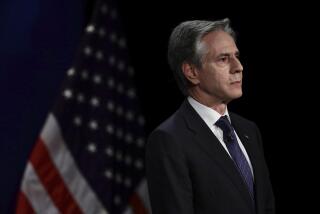U.S. orders new sanctions against Russia over chemical attack in Britain
Reporting from Washington — The U.S. on Wednesday cleared the way for a new round of sanctions against Russia after the State Department formally concluded that Moscow violated the international ban on chemical weapons with a nerve agent attack this year against a former Soviet spy and his daughter.
That determination — which Congress had been pushing the Trump administration to make since March — triggers mandatory sanctions under a 1991 U.S. law.
International monitors already had blamed Russia for the attempted assassination in Britain of Sergei Skripal and his adult daughter, Yulia, in March.
At that time, several countries took diplomatic action against Moscow, including the U.S., which expelled 60 Russian diplomats.
Russia has denied any role in the attack.
The new sanctions will target national security and “sensitive” equipment, goods, electronics and technologies that Moscow seeks to import from the United States, senior State Department officials said.
It could hit as much as 70% of Russia’s state-run economy and 40% of its workforce, said one of the officials, who briefed reporters on condition of anonymity in keeping with State Department rules.
U.S. lawmakers had asked the Trump administration to make the formal determination to trigger sanctions in March.
After the White House missed a two-month deadline to take action, Rep. Ed Royce (R-Fullerton), who chairs the House Foreign Affairs Committee, sent a second letter two weeks ago, pressing the president to act.
Critics say the administration’s slow response was another example of Trump’s reluctance to confront Russian President Vladimir Putin.
On Wednesday, Royce praised the new sanctions.
“The administration is rightly acting to uphold international bans on the use of chemical weapons,” Royce said in a statement. “The mandatory sanctions that follow this determination are key to increasing pressure on Russia. Vladimir Putin must know that we will not tolerate his deadly acts, or his ongoing attacks on our democratic process.”
Administration officials downplayed the delay in imposing the sanctions, saying it was because of the complicated nature of the measures. They noted that in previous applications of the same law — against Syria and North Korea — deadlines also were missed.
The officials also sought to dispel any idea that Trump dragged his feet or that there were internal disputes over whether to impose additional sanctions.
“This is not about different bits of the administration going in different directions,” the official said.
Trump also delayed enacting an earlier package of sanctions ordered by Congress to punish Moscow for its interference in the 2016 U.S. election and continued meddling.
The sanctions announced Wednesday could be worth hundreds of millions of dollars, the State official said, impacting a “very great sweep” of the Russian economy.
But they also said the new order would contain “carve-outs,” or exceptions to the sanctions, including space programs and foreign aid.
The sanctions will go into effect in about two weeks while Congress is notified, the statement said.
If Russia cannot demonstrate it has stopped using chemical or biological weapons within 90 days, the administration would be required to levy a second “draconian” tranche of sanctions, the official said.
The use of chemical or biological weapons violates the Chemical and Biological Weapons Control and Warfare Elimination Act of 1991.
Twitter: @TracyKWilkinson
UPDATES:
2:50 p.m.: The article was updated with reaction from Royce and additional background.
The article was originally published at 12:40 p.m.
More to Read
Sign up for Essential California
The most important California stories and recommendations in your inbox every morning.
You may occasionally receive promotional content from the Los Angeles Times.











